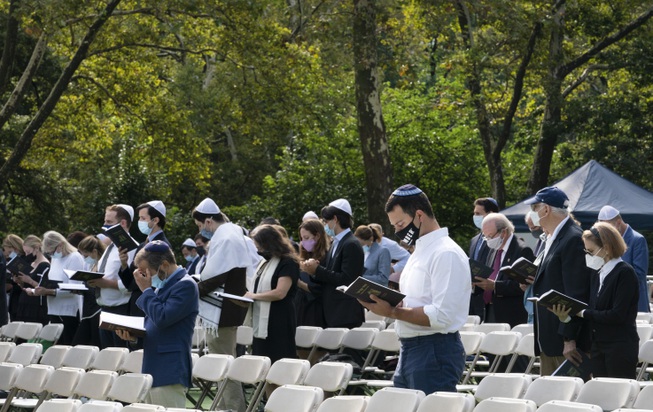
Mark Lennihan / AP, file
Congregants attend a Yom Kippur service held in Central Park by Temple Emanu-El, Thursday, Sept. 16, 2021, in New York. The Jewish service is being held outdoors so that worshippers feel comfortable and safe during the coronavirus pandemic.
Sunday, Oct. 2, 2022 | 2 a.m.
View more of the Sun's opinion section
Yom Kippur should be for everybody.
Tuesday night marks the observance of the holiest Jewish holiday of Yom Kippur — the Day of Atonement.
Jews around the world gather together to observe this most solemn day during which they ask God to forgive their sins from the prior year and inscribe them in the Book of Life for the following year.
This ritual has been observed since the earliest of days. Most people will remember the story about Moses climbing Mount Sinai where he received from God two stone tablets upon which were written the Ten Commandments.
These were God’s laws to be observed by the Jewish people — and don’t forget they have formed the basis for moral behavior for all monotheistic religions that have come after — as their covenant for holding a special place in God’s plan for mankind.
Of course, people being human, many of them gave up on Moses before he returned from Mount Sinai and, instead, built a golden calf to worship. Remember, they had just escaped from bondage in Egypt where worshipping idols was a really big deal.
When Moses finally came down the mountain carrying those two heavy stone tablets as if they were the weight of the world — they were — he saw that his people had lost faith in their journey, his leadership and the God who saved them from Pharoah.
He was angry. So he destroyed those tablets and, seemingly with them, the future of mankind.
After some reflection, Moses headed back up the mountain where he received a second set of stone tablets complete with the Ten Commandments and a stern warning from God that his people must no longer act like spoiled little children — or words to that effect.
That time with God, when Moses repented for the sins of his people, became known as the Day of Atonement. And Jews have been observing that day ever since.
There are, of course, lessons for all mankind in its observance. Not only has it served as a template for religions that have followed, but it has demonstrated that commitment human beings have made to their faith since the beginning of recorded history.
In the Jewish tradition, Rosh Hashana is observed 10 days before Yom Kippur. That is the beginning of the Jewish New Year, and it is the time when God writes each person’s name down in the Book of Life. The following Ten Days of Awe are the time when people of faith commit themselves to do better in the next year and not repeat the sins that have God questioning his Book of Life decisions.
On Yom Kippur, we all confess our sins and ask God for forgiveness — all in the hope that he will seal our names in the Book of Life for another year.
Call it by many other names and define it with rituals a little bit different, but most religions that have grown from Judaism follow similar themes. It is about people recognizing their faults, repenting for them and promising to do better.
Like most Jews on the planet, I will observe the rituals and say the prayers that have set Yom Kippur apart from all other Jewish holiays. And that means I will confess my own sins and seek forgiveness in the hopes that my name will be sealed for yet another year in the Book of Life.
It is said that only God can forgive our sins but each of us can forgive the transgressions of others toward us. That’s a nice way of saying that forgiveness is divine.
As I look around the world and see the horrors that are being visited upon people — often the least among us — it is hard for me to continue to forgive the transgressions of others that have caused in part, much of the heartache that has befallen other humans.
Whether it is mankind’s contribution to climate catastrophes that destroy lives and futures; wars committed by Russian bullies upon women and children for no apparent reason; people using our differences to create division, fear and anger toward our fellow human beings rather than living the life that faith commands, it appears that we are closer to a golden calf moment than we are to a life of faith in a future that is defined by good acts, not bad.
So, I will repent for my sins and seek forgiveness. But I don’t think that I alone can carry the burden of repenting for so many of the sins of others, people who refuse to acknowledge their own complicity in this crisis of faith in our fellow man.
Nope. For that, people who are Jewish or otherwise need to consider how they will do better and how they will earn another year in the Book of Life.
This whole world can use a Day of Atonement about now.
Brian Greenspun is editor, publisher and owner of the Sun.
